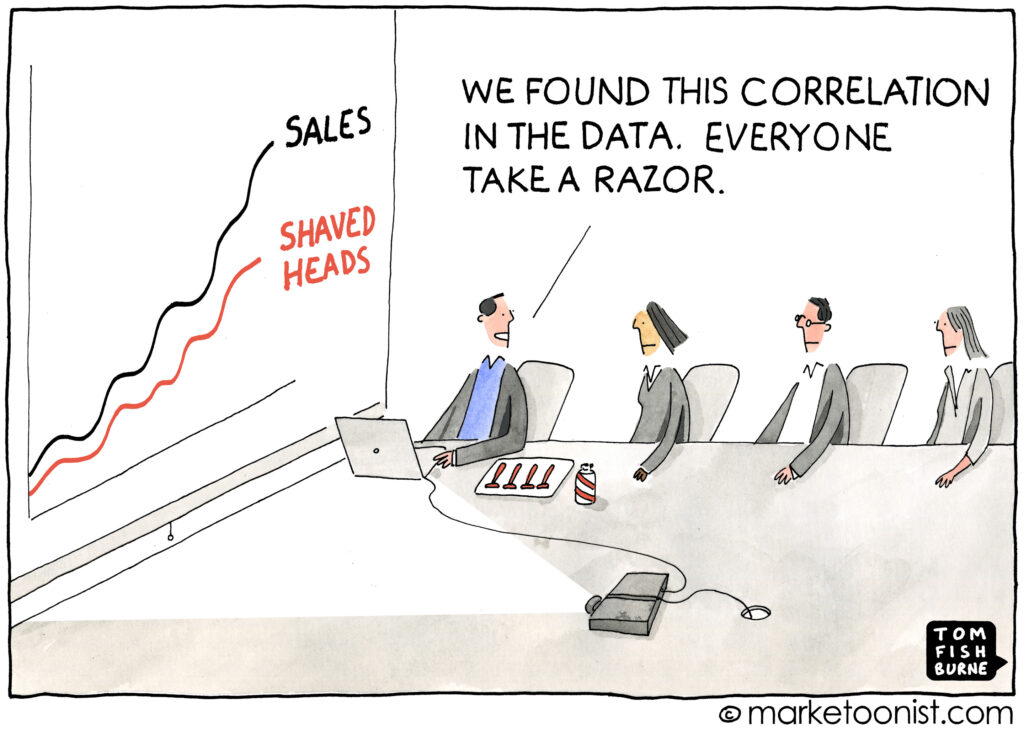It’s a convenient persuasion mechanism that marketers use to associate any/all marketing activity they perform as the direct causing factors of success.
It’s also a load of horse dung.
Let’s start with the definitions, as they’ll provide proper context here.
Correlation is a connection or relationship between two or more things. While, causation is when an action causes a direct outcome…i.e. action A causes outcome B.
Marketers delight in creating elaborate campaign reports showing impressions, engagement and clicks – surely proving the campaign was a success.
But the reality is much different.
Here’s causation to consider – bad marketing causes bad things to happen…
…like destroying brand trust, goodwill, and loyalty.
It’s just like getting bad travel instructions to start your journey…
…you wanted to go to Vegas but ended up in Fresno.
Happens all the time in the marketing world.
The confusion often begins when the desired outcome is focused on the medium and not the message…
…where success relies on data and KPI’s versus actual results…
…where sales tactics are favored over retention and loyalty…
…where consumers are treated like numbers in a data stream.
Brands don’t be hasty in your pursuit of digital attention – consumers know when you’re in a rush, it’s written all over your marketing faces.
Embrace boredom and resist the urge to continually chase shiny new objects.
New is new, not better.
Your trip to Vegas will be filled with detours, traffic jams, and take way longer than you originally planned, but that’s okay – at least you ended up in the right place.
Correlation does not imply causation, no matter what today’s impatient marketer will tell you.
Momentum and Chicken Soup
Think of marketing as a moving body having motion.
When your marketing has momentum, it directly impacts both the mass and velocity of your brand.
The goal is to first create momentum, then sustain it. Sustained momentum builds upon itself.
And it’s perpetual.
It’s the perfect outcome for effective marketing.
For further clues, look at the stock market. When the market has momentum, it moves higher despite the underlying market conditions and fundamentals. (Just look at today’s market as a prime example.)
You can try and fight momentum, but you will most assuredly lose.
It has too much force and too much weight – it has to move in one direction, cascading like a waterfall, and it can’t be stopped.
Brands like Apple, Google, Amazon, and Facebook have that kind of momentum today.
Marketing momentum doesn’t happen overnight and doesn’t happen by accident.
But just like making chicken soup from scratch, the building block “starter stock” ingredients are all pretty much the same…
…patience, persistence, relevance, repetition, and frequency…
… where each ingredient adds its own layer and dimension to the recipe…
…and you’ll know right away if an ingredient is missing, or they are out of balance.
If you want to gain a deeper perspective on how effective marketing works – make some homemade chicken soup!
Who is Stealing Your Audience?
Brands – where did your audience go?
Consider…
…for travel agents audiences went to Booking.com, TripAdvisor & Expedia…
…for real estate audiences went to Zillow & Trulia…
…for taxi cabs, audiences went to Uber & Lyft…
…restaurant audiences went to DoorDash, Postmates & Uber Eats…
…for books, retail, and pretty much everything else, audiences went to Amazon…
…for car dealers, audiences went to Cars.com, TrueCar & CarMax…
…in the marketing world audiences went to Google & Facebook.
What happened here?
The “middle” is now the “beginning and the end.”
Game over, right?
Well, if your business is overly reliant on the middle, it might be. Why? Because you don’t write the rules here, you don’t control the game, you just have to endlessly try and figure out the best way to play.
Or, you can do it in a different way.
Choose to create meaningful, valuable, and remarkable experiences directly with the audience you seek to serve.
Be sought after versus being found on search engines.
Instead of chasing algorithms, impressions and clicks, focus on delivering what you promise in such a way that your customers will spread the word.
The game is rigged, but only if you choose to play it.
And remember, it’s what you don’t charge for that will keep them coming back.
